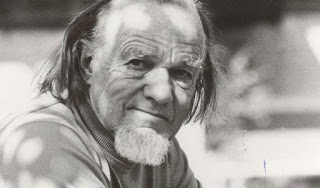I was about nineteen. There were blue
and purple lights flashing around us, and chimes twinkled from the stage. People raised their hands in victorious surrender as we sang, “He loves us,” again and
again. There was not a dry eye, as they say.
And then I had some sort of vision. I felt a warm hand on
the back of my neck. A man’s chest was in front of me, his arm pulling me into
an embrace. But no one was there.
A month later I stupidly tried recounting the experience to
a friend of mine who had recently departed from her faith. “I’m not making this
up,” I insisted. She looked at me sadly.
I’ve found myself at a few places along the Christian spectrum—Presbyterian, non-denominational, and now Catholic—and as such I’ve
encountered a wide range of answers to the question: how do you know God? Once
I thought I understood. I thought I could just reach out and grab God like some
low-hanging fruit, or that I could sit with him at a bistro and chat over a latte,
but now I’m not so sure.
I heard a story from one of my acquaintances that a voice
told him to get off a train and, without any college education, simply ask for a
job at the New York Times. He got it
and worked there for twenty years. I’ve known someone who said she healed a
stranger’s knee; she said the decayed cartilage suddenly reappeared and the
man could walk again. I have many more friends with less extreme accounts who nonetheless swear by a voice, maybe audible, maybe not, that directs their
paths.
Naturally, most people outside this evangelical bubble think
these more dramatic stories are bogus or delusional,
as my friend understandably did when I tried to tell her what I’d seen.
Others, even ones who believe in God and his enduring care
for us, are hesitant to label something as “the voice of God.” They see
“God-sightings” as an easy way out of responsibility—that waiting for a divine green
light before taking action is simply cowardice or immaturity.
I suppose I see both sides.
Just a month or so after my strange “vision,” I spent some
time at English L’Abri, a
religious center started by the late reformed theologian Francis Schaeffer. At
lunch one day we spoke about these kinds of dramatic voices and spectacles, and
wondered what to make of them. Does God really speak to us this way?
One woman gave what I consider to be a thoughtful response. God
can and does communicate to us however he wants, but just as how she wouldn’t
go gossiping about some intimate moment with her husband, it’s indiscreet for
us to broadcast our deepest and most tender spiritual moments to others.
I’m still learning myself, and I’m not about to prescribe
one way of communing with the Almighty, but there’s something to be said for
not waiting around for the Will of God to magically grace our heads while we
sleep when we could be acting on what we already know he wishes us to do.
Sometimes our religious fanfare keeps us from doing these things; loving one
another, serving our communities, and doing our work ethically and faithfully.
At the end of the day I don’t know how much God cares that I chose Barnard
College over St. John’s. He would be with me either way.
At the same time, it’s all too easy to live as if what we
see is all there is. There’s something very powerful about stopping, listening,
and looking for the moments of wonder and mystery when so many of us board the
train with our ear buds in, when we're the first ones out the door when it enters the
station. And we do know from scripture that the Holy Spirit is with us, interceding
for us and guiding us, even when we don’t ask for it. In the words of Francis
Schaeffer, God is there, and He is not silent.
 That’s one reason why regularly partaking in the sacraments is so
important: the joining of the mundane with the magnificent. It lifts our
eyes to the heavens, but reminds us that what’s around us—the kneeling people,
the wooden benches, the flowers on the altar—they are good. When we spend our days
anxious over whether that image was a heavenly vision or hallucination, our
broken foot a plot of the devil or an unfortunate coincidence, we lose valuable
time which we could be using to actually live.
That’s one reason why regularly partaking in the sacraments is so
important: the joining of the mundane with the magnificent. It lifts our
eyes to the heavens, but reminds us that what’s around us—the kneeling people,
the wooden benches, the flowers on the altar—they are good. When we spend our days
anxious over whether that image was a heavenly vision or hallucination, our
broken foot a plot of the devil or an unfortunate coincidence, we lose valuable
time which we could be using to actually live.
Rebekah Mays is a Barnard College graduate originally from Austin, Texas. She currently works and writes in New York City. You can find more of her writing on her blog Iced Spiced Chai or follow her on Twitter @smallbeks.
You can also follow On Pop Theology on Twitter @OnPopTheology or like us on Facebook at www.facebook.com/OnPopTheology.
You might also like:



No comments:
Post a Comment